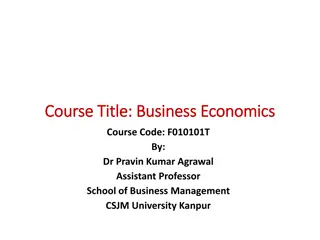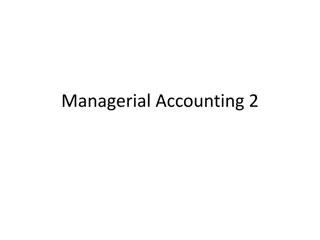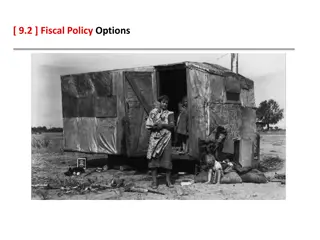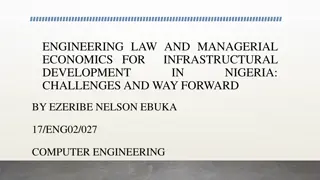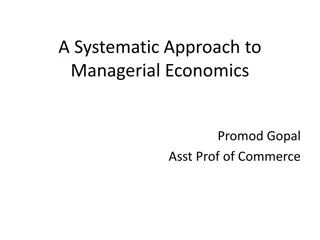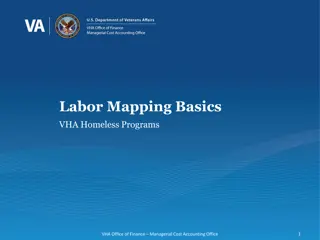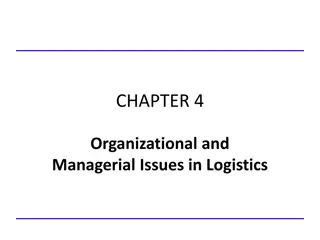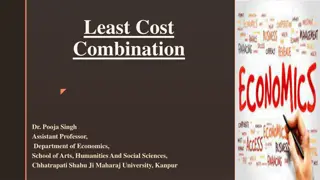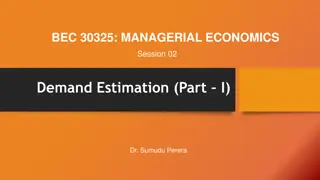MANAGERIAL ECONOMICS
Managerial economics is the application of economic concepts to managerial decision-making. It bridges the gap between economic theory and business practice, helping firms optimize resource allocation and maximize profits. By analyzing microeconomic and macroeconomic factors, managers can make informed decisions to ensure efficient organization functioning.
Download Presentation

Please find below an Image/Link to download the presentation.
The content on the website is provided AS IS for your information and personal use only. It may not be sold, licensed, or shared on other websites without obtaining consent from the author.If you encounter any issues during the download, it is possible that the publisher has removed the file from their server.
You are allowed to download the files provided on this website for personal or commercial use, subject to the condition that they are used lawfully. All files are the property of their respective owners.
The content on the website is provided AS IS for your information and personal use only. It may not be sold, licensed, or shared on other websites without obtaining consent from the author.
E N D
Presentation Transcript
MANAGERIAL ECONOMICS
A close interrelationship between management and economics had led to the development of managerial economics. Economic analysis is required for various concepts such as demand, profit, cost, and competition. In this way, managerial economics is considered as economics applied to problems of choice or alternatives and allocation of scarce resources by the firms. Managerial economics is a discipline that combines economic theory with managerial practice. It helps in covering the gap between the problems of logic and the problems of policy. The subject offers powerful tools and techniques for managerial policy making.
Managerial Economics Definition Managerial economics is concerned with the application of economic concepts and economic analysis to the problems of formulating rational managerial decisions. Managerial economics is the application of various economic measures, policies, principles, tools, methods, and theories to enable decision-making and problem-solving. It highlights techniques for efficient utilization of financial, human, and material resources so that profits can be maximized. It is a pragmatic and normative approach it solves a business s internal (microeconomic) problems by analyzing macroeconomic threats and challenges.
Micro, Economics Relationship Macro, and Managerial Microeconomics studies the actions of individual consumers and firms; managerial economics is an applied specialty of this branch. Macroeconomics deals with the performance, structure, and behavior of an economy as a whole. Managerial economics applies microeconomic management decisions. It is more limited in scope as compared to microeconomics. Macroeconomists study aggregate indicators such as GDP, unemployment rates to understand the functions of the whole economy. Microeconomics and managerial economics both encourage the use of quantitative methods to analyze economic data. Businesses have finite human and financial resources; managerial economic principles can aid management decisions in allocating these resources efficiently. Macroeconomics models and their estimates are used by the government to assist in the development of economic policy. theories and techniques to
Nature of Managerial Economics Managers study managerial economics because it gives them insight to reign the functioning of the organisation. If manager uses the principles applicable to economic behaviour reasonably, then it will result in smooth functioning of the organisation. Managerial Economics is a Science Managerial Economics requires Art Managerial Economics for administration of organization Managerial Economics has components of micro economics Economics has components of macro economics Managerial Economics is dynamic in nature
Managerial Economics is a Science Managerial Economics is an essential scholastic field. It can be compared to science in a sense that it fulfills the criteria of being a science in following sense: Science is a Systematic body of Knowledge. It is based on the methodical observation. Managerial economics is also a science of making decisions with regard to scarce resources with alternative applications. It is a body of knowledge that determines or observes the internal and external environment for decision making. In science any conclusion is arrived at after continuous experimentation. In Managerial economics also policies are made after persistent testing and trailing. Though economic environment consists of human variable, which is unpredictable, thus the policies made are not rigid. Managerial economist takes decisions by utilising his valuable past experience and observations. Science principles are universally applicable. Similarly policies of Managerial economics are also universally applicable partially if not fully. The policies need to be changed from time to time depending on the situation and attitude of individuals to those particular situations. Policies are applicable universally but modifications are required periodically.
Managerial Economics requires Art Managerial economist is required to have an art of utilising his capability, knowledge and understanding to achieve the organizational objective. Managerial economist should have an art to put in practice his theoretical knowledge regarding elements of economic environment.
Managerial administration of organisation Economics for Managerial economics helps the management in decision making. These decisions are based on the economic rationale and are valid in the existing economic environment.
Managerial economics is helpful in optimum resource allocation The resources are scarce with alternative uses. Managers need to use these limited resources optimally. Each resource has several uses. It is manager who decides with his knowledge of economics that which one is the preeminent use of the resource.
Managerial components of micro economics Economics has Managers study and manage the internal environment of the organization and work for the profitable and long term functioning of the organisation. This aspect refers to the micro economics study. The managerial economics deals with the problems faced by the individual organization such as main objective of the organisation, demand for its product, price and output determination of the organisation, available substitute and complimentary goods, supply of inputs and raw material, target or prospective consumers of its products
Economics macro economics has components of None of the organisation works in isolation. They are affected by the external environment of the economy in which it operates such as government policies, general price level, income and employment levels in the economy, stage of business cycle in which economy is operating, exchange rate, balance of payment, general expenditure, saving and investment patterns of the consumers, market conditions etc. These aspects are related to macro economics.
Managerial Economics is dynamic in nature Managerial Economics deals with human beings (i.e. human resource, consumers, producers etc.). The nature and attitude differs from person to person. Thus to cope up with dynamism and vitality managerial economics also changes itself over a period of time.
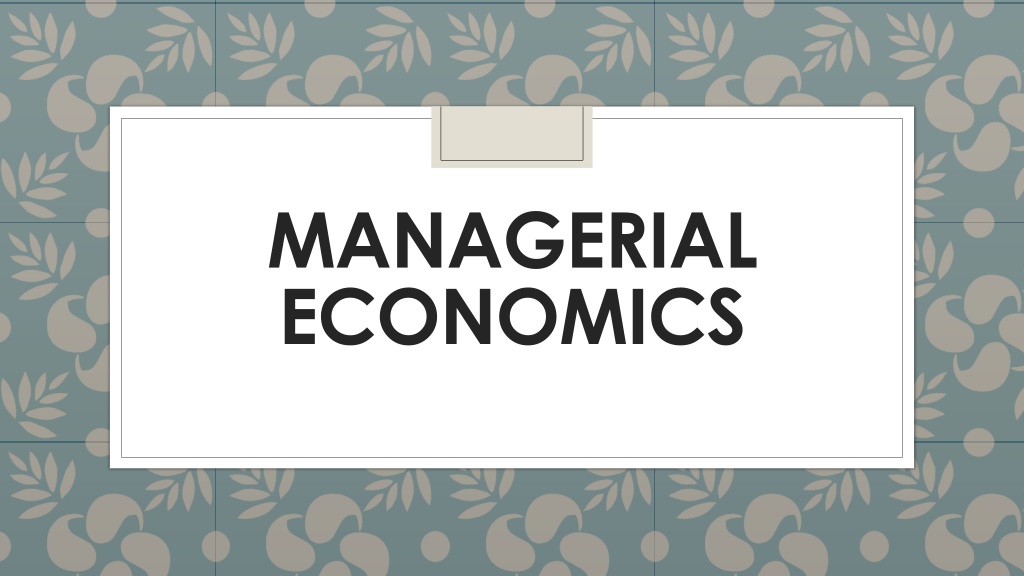
 undefined
undefined







